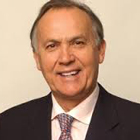Advancements & Achievements« Back to Advancements & Achievements Listings

Building a Business One Brick at a Time
By Sasha Planting
Next week Christo Wiese, chairman of Shoprite, Pepkor, Brait and director of Steinhoff, will be inducted into the World Retail Hall of Fame, in Rome. He is the first retailer from Africa be honoured in this way.
He jokes that he is just a shopkeeper. Technically it could be true. He oversees an empire that spans four continents, almost 20 brands and over 10,500 stores. Pepkor, which Wiese has presided over virtually since its inception, turned 50 last month. With 2800 stores in Africa and a sales turnover of R38.6 billion in 2014, it was the first retailer to recognise that if you treat poor people with dignity, and supply them with affordable merchandise, they will become loyal and valuable customers.
The man from Upington has come a long way. Incredibly, he says that he is not, and has never been, driven by a passion for retail. “Retail is an accident of history, it is where I came from. I was driven by a great desire to succeed. Upington was a wonderful, but harsh and isolated place to grow up. It breeds hardy people.”
The son of a general dealer, Wiese’s family bought into Pep in 1965, the same year it was founded. By the time he was in his third year at university he was actively involved, ultimately giving up a career in law to run the business full time. In 1972 the group listed on the JSE. By then, it had acquired its competitor Half Price Stores. In 1979 Pep acquired Shoprite, and by 1981 he was chairman of the group.
Between 1986 and 1991 the group acquired Ackermans, Checkers, OK Bazaars, Cashbuild and Stuttafords. “That is how a business grows, its how an individual grows. You are out there in the arena and you see opportunities – so you take them.”
People think it was easy. It was not easy, he says. There were many times when the top five or six people in the company had to wait for their salary. The business needed money – it was growing fast, he says. “You must understand that the business was all important. If you had to step back in the interest of the business, that’s what you did.”
The goal, from the outset, was to grow Pep into a national chain. “There wasn’t a lot of money to realise that kind of ambition. But we knew that when the business got going, we would find the money. The easiest thing in the world is money, the challenge is to find the right opportunities and the right people.”
The odds in the 1960s and 70s were stacked against an Afrikaans family, starting a business in Upington. “People didn’t believe a bunch of boere could run a national retail business. At the time the South African retail scene was unequivocally dominated by English and Jewish people.”
While doors were not closed, they were not open either. “You just had to do things and gain people’s respect or at least their notice. Retail is a business that you build one brick by one brick, store by store. That is how you build a successful business – it takes 50 years – a lifetime.”
No time to doubt
Self-doubt isn’t something Wiese suffers from. “I knew I would make mistakes and that they would cost me. The challenge is to make it right and not roll over and die.” One mistake was nearly fatal. In 1985, following the infamous Rubicon speech, the rand collapsed. Pepkor, which had a huge exposure to dollar loans, lost almost 40% of its value overnight. “We restructured and fought our way out of that one.
“If you start having doubts…” he a pauses and then says with emphasis, “this is a lesson for young entrepreneurs: You and you alone draw your horizons. You and you alone decide where you want to go. That is how the world works. People will tell you that you are wrong colour, wrong religion; that you have grown up in the wrong town, got the wrong qualification and therefore your potential is capped. It is done subtly but it is out there. I say this, particularly to our black South Africans, never allow anyone to put that on you. Look yourself in the mirror and say if that guy can do it, I can do it.”
Fortitude is a theme he returns to often. “People talk about leveling the playing fields. You level them. No one else is going to do it for you.”
Faith in the future
A leader, any leader, he says, needs a clear set of beacons. A business too should have similar guidelines. His, he says, are very similar to those drawn up for Pep by founder Renier van Rooyen. They include faith (in yourself, your country, your people), positive thinking (tackle something with the firm intention of making it better or making it work), hard work (that is indispensable), enthusiasm (you cannot just exist from day to day) and compassion.
The quality of leadership is a huge determinant of a business or society or a country. “I say this carefully in public: do not ever judge a country by the bad quality of temporary political leadership. By definition political leadership is temporary. Even Mugabe is temporary.” Great leaders are few, he adds, but look at the difference they can make. Look at Lee Kuan Yew, the first Prime Minister of Singapore, who governed for more than three decades from 1959 to 1990. “He single-handedly transformed a hellhole into one of the best places in the world to live.”
The absence of leadership in the country (or even the world) today doesn’t make him despondent. “No never; frustrated yes, even angry. There are many things being done that are so obviously not intelligent. The visa regulations just boggle the mind.” But he hastens to add, “look around you and you will see the stupid things people are doing in other countries. The difference is that other countries can afford their mistakes.”
It’s not about ideology
A world without ideological differences cannot exist. But we can all agree on one thing – we need to grow the economy, he says. “Where we differ is how – more state intervention or less state intervention?” But even if it’s more intervention, he says, you cannot blame a poorly run state on ideology. “We must professionalise our civil service. Fraud and faked qualifications has nothing to do with ideology. The state is also a business. You need the most competent people to do the work. Pay them well and let them get on with the job.”
The decline in South Africa’s tourism industry frustrates him. “It is the one industry whose growth has consistently outperformed the world average. To make mistakes that have nothing to do with ideology – that is just unintelligent.”

Holding people to account
Wiese doesn’t consider himself a hard task-master. “As Pieter Erasmus says you give people a mandate with the authority and responsibility to carry it out. From there they mark their own tests. It is about being clear about what you want.”
He concedes in negotiations he is known to be tough – though he doesn’t see it that way. “There is always give and take – you have to decide on the hoof what you can give.”
What about the R63 billion sale of Pepkor to Steinhoff? Some people believe that Wiese and Brait got the better end of the bargain? “Instinctively Markus and I believed that putting these businesses together would be a 2+2=5 deal. Yes Steinhoff paid a full price for Pepkor. But it’s a brilliant business – it’s not a good business – it is an exceptional business with exceptional management. You will never get a business like that cheaply.
“But look what happened to Steinhoff since the deal – the share has moved from R52 to R80. That’s how good deals work.”
Leading from the front
When you are running a business, as an operational CEO, it is essential to be hands on, to lead from the front, he says.
“My input is on another level. I don’t run businesses. My input is more strategic. I see myself as providing rock solid support to my colleagues who run businesses – Markus Jooste, Whitey Basson, Arnold Goldstone (Invicta), Pieter Erasmus. They will never doubt their support from me.”
Engagement is the spice of life
Wiese could never be passively invested in the markets. “My investments are driven by two things. One I like the engagement. I like to believe that I can make a difference. And two, I have a moral commitment to the people who have invested their lives in these businesses. They will never wake up and find I have sold out and am riding into the sunset. Even with our new businesses – New Look, Iceland and Virgin Active – we are not owners passing through.”
So are you a retailer or a businessman? “A businessman. For me it is about developing businesses, developing people and making a contribution to my country. It’s about not wasting time on earth and hopefully making life better.”

